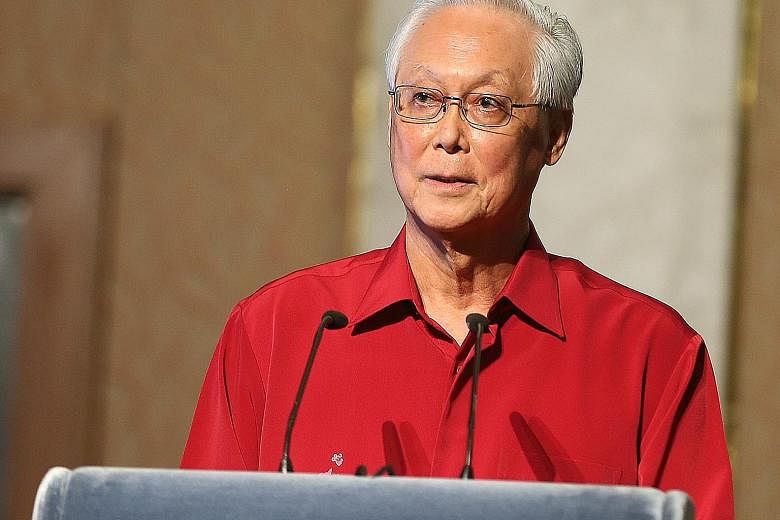A symbolic gesture between Japan and China to shed historical baggage, in the same vein as US President Barack Obama's recent visit to Hiroshima, would go a long way to foster peace in the region, said Emeritus Senior Minister Goh Chok Tong at a major forum here.
He also urged Japan, as a neighbour of China and strategic partner of the United States, to play a constructive role in bolstering US-China ties. "If Japan comes across as distrusting China and taking steps with others to contain China, then we are going to have ill relations for a long time… Japan must not risk being seen as working to keep China from rising," he said.
Speaking at the 22nd Nikkei Future of Asia Conference yesterday, Mr Goh also called on Asian leaders to share a common vision in dealing with growing external challenges and resist the urge to turn inwards and pander to populist sentiments.
He cited five challenges that must be overcome in order for the region to achieve its full potential - maintaining an open and inclusive attitude, resolving territorial disputes, pushing for economic integration, shedding historical baggage, and countering terrorism.
The extent to which Asian governments can successfully manage these challenges will determine the region's future, Mr Goh said during his keynote speech.
-
ESM Goh Chok Tong on...
"While the challenges may impact differently on individual countries, it is important they resist the temptation to pull back and look inwards... (and) be consumed by populist politics. Instead, we need to keep our focus on the longer-term shared interests," he said.
China's rise in recent years and its growing rivalry with the US - which maintains a strong presence in Asia through its security alliance with Japan and South Korea - have shifted the strategic balance in the region and caused tension over territorial disputes in the South China Sea, said Mr Goh. Noting that heightened nationalism in the claimant states can increase the possibility of conflict, he emphasised that the challenge is for the countries involved to settle the disputes peacefully and in accordance with international laws, so as to ensure the freedom of navigation over the waters.
Another challenge for the region is to ratify the Trans-Pacific Partnership (TPP), a trade deal among 12 Asia-Pacific states including the US, Singapore, Australia and Japan.
With growth faltering, Mr Goh said, it has become even more crucial to advance economic integration by pushing for regional deals like the TPP and the Regional Comprehensive Economic Partnership (RCEP), which can give impetus to economic reform and restructuring.
Mr Goh said: "If the RCEP and TPP can be concluded and ratified respectively, it would go a long way to realise the eventual goal of regional economic integration which will be a win-win outcome for all countries concerned."
He lauded Japan's efforts in being one of the first few countries to start ratifying the TPP.
According to Mr Hiroyuki Ishige, chairman of the Japan External Trade Organisation who also spoke at the conference, his agency has organised more than 100 seminars on the TPP last year, and another 150 are planned for this year. He urged his country to do more, adding that early ratification of the TPP will boost Asia's development and become a "decisive trump card in determining the future of Asia".
Other economists who spoke at the annual forum, which carries the theme "Rising to global challenges and realising Asia's potential", agreed that ratification will not be easy, but it will be worth the effort.
The two-day event organised by Japanese publisher Nikkei Inc features speakers such as Asean secretary-general Le Luong Minh and World Bank chief economist for East Asia and Pacific region Sudhir Shetty. It also features topics from the global economic outlook to the prospect of free trade in Asia.
Mr Shetty said the global economic outlook is "gloomy" with an expected growth rate of 2.5 per cent. China's slowdown, he added, will impact every other country, but there is no need to panic yet as the decline will be gradual - he called it a "glide path".
There are also bright sparks in the horizon. India is next in line to rise, and Mr Shetty said countries like Malaysia and Indonesia have done well to cushion a slower growth rate by tightening fiscal policy and seeking new revenue sources.
Mr Goh added: "While China has a big influence on us, we must not depend on China alone. We've got to restructure our own economy in order to grow. India, I think, is a hope for us. While China slows down, India should take the advantage and grow its economy by 8, 9 per cent and be the new engine for the world economy... I think all of us can play our part."

